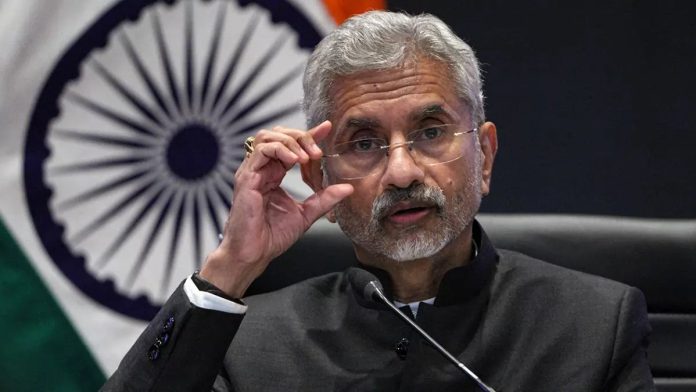NEW DELHI, Oct 22: India is looking at resuming visa services for Canadians “very soon” if it sees progress in the safety of its diplomats in Canada, External Affairs Minister S Jaishankar said today, even as he asserted that New Delhi’s decision on ensuring parity in diplomatic presence with that country is in line with the Vienna Convention.
In comments that came days after Ottawa pulled out 41 of its diplomats from India, Jaishankar said New Delhi insisted on having diplomatic parity as it had concerns about the “continuous interference in our affairs by Canadian personnel”.
“We have not made much of that public. My sense is that over a period of time, more stuff will come out and people will understand why we had the kind of discomfort with many of them which we did,” he said, replying to a question on the India-Canada ties at an interactive session.
India has already rejected Canada’s contention that the move for the withdrawal of the 41 Canadian diplomats amounted to a violation of the Vienna Convention on diplomatic relations.
“The relationship right now is going through a difficult phase. But I do want to say that the problems we have are with a certain segment of Canadian politics and the policies which flow from that,” Jaishankar said.
The ties between India and Canada nosedived after Canadian Prime Minister Justin Trudeau alleged on September 18 that there was a potential link between Indian agents and the killing of Khalistani separatist Hardeep Singh Nijjar in British Columbia in June.
New Delhi strongly trashed the charges. Days later, it announced temporarily suspending issuance of visas to Canadian citizens and asked Ottawa to downsize its diplomatic presence in India.
On resuming the visa services, Jaishankar said, “If we see progress there, I would very much like to resume the issue of visas. My hope would be that it would be something which should happen very very soon.”
“Some weeks ago, we stopped issuing visas in Canada because it was no longer safe for our diplomats to go to work to issue visas. So their safety and security was the primary reason we had to temporarily stop the issuance of visas,” he added.
“My expectation is that the situation would improve in the sense that our people would have greater confidence in being able to do their basic duty as diplomats because as you know, ensuring the safety and security of diplomats is the most fundamental aspect of the Vienna Convention,” Jaishankar said.
“And right now, that is what has in many ways been challenged in Canada that our people are not safe, our diplomats are not safe,” he said, adding that India would start the visa services if there is progress in the safety of its diplomats.
Jaishankar said the “big concern” people have is regarding visas.
Referring to the issue of diplomatic parity, he said “it is very much provided for by the Vienna Convention, which is the relevant international rule on this”.
“There is this whole issue of parity that … How many diplomats are there of one country versus how many diplomats are there of the other country. Parity is very much provided for by the Vienna Convention, which is the relevant international rule on this,” he said.
“But in our case, we invoked parity because we had concerns about the continuous interference in our affairs by Canadian personnel,” the minister said.
India on Friday rejected Canada’s attempt to “portray” the withdrawal of the 41 Canadian diplomats from the country as a violation of international norms and asserted that ensuring two-way diplomatic parity is fully consistent with the provisions of the Vienna Convention on diplomatic relations.
India’s comments came after Canadian Foreign Minister Melanie Joly, announcing the return of the diplomats from India, described New Delhi’s action as “contrary to international law” and in violation of the Vienna Convention on diplomatic relations.
Joly also described India’s actions as “unreasonable and escalatory”.
The Ministry of External Affairs (MEA) had said the bilateral relations, the much higher number of Canadian diplomats in India and their continued interference in India’s internal affairs warranted parity in mutual diplomatic presence in New Delhi and Ottawa. (PTI)


